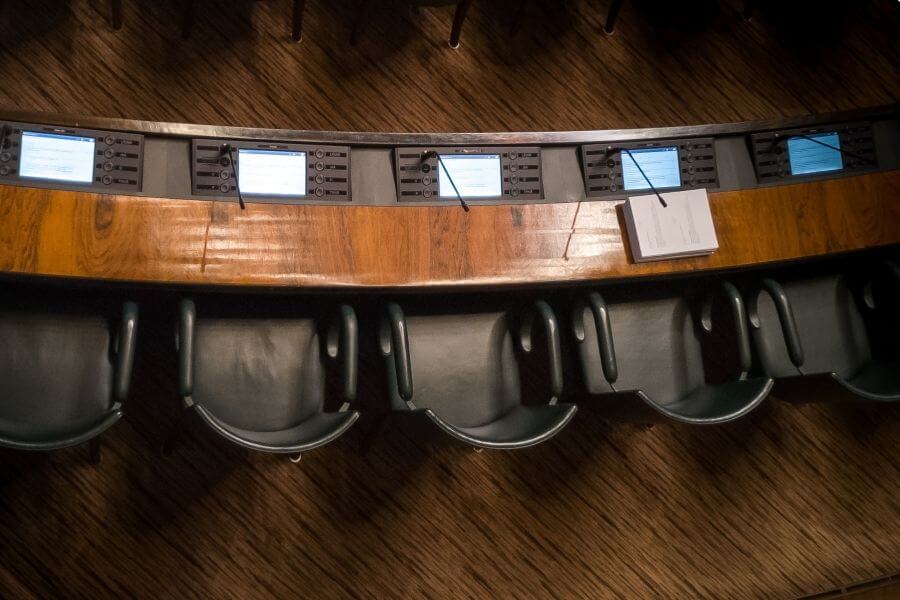
No, but people’s assessors exist in China, who, together with judges, will form a collegial panel to hear cases in specific circumstances.
There is no jury in China, instead, there are people’s assessors. In particular cases, people’s assessors and judges will form a collegial panel to hear cases together.
I. How do people’s assessors hear cases?
In particular cases, people’s assessors will take part in a collegial panel to hear cases with judges, in which only judges can act as the presiding judge.
According to China’s Civil Procedure Law (CPL), the people’s assessors have equal rights and obligations as judges. [1]Therefore, in the court, they sit at the bench.
Generally, there may be a three-member collegial panel composed of at least one judge and one-two people’s assessors, or a seven-member collegial panel composed of three judges and four people’s assessors.
The people’s assessors have the same “one person, one vote” right as judges in the collegial panel, which follows the principle of majority rule.
In the three-member collegial panel, the people's assessors can independently express opinions and exercise the voting rights regarding the fact-finding and application of law.
However, in the seven-member collegial panel, the people’s assessors can only express opinions and make their votes independently on fact-finding; while regarding the application of law, they can only express opinions but are excluded from voting.
The court chooses people’s assessors randomly from their list.
II. What kind of cases can be heard by the people’s assessors?
People’s assessors can only participate in cases of the first instance, as prescribed by Article 39 of CPL. More detailed regulations are provided in the “Law of the People's Republic of China on People's Assessors”(人民陪審員法) in 2018 and its judicial interpretation, i.e. the “Interpretation of the Supreme People’s Court on Several Issues concerning the Application of the Law of the People's Republic of China on People's Assessors” (最高人民法院關于適用《中華人民共和國人民陪審員法》若干問題的解釋) in 2019.
Where a criminal, civil, or administrative case of first instance falls under any of the following circumstances, the case shall be tried by a collegial panel composed of people’s assessors and judges:
(1) involving the interests of a certain group or public interests;
(2) attracting extensive attention of the general public or otherwise having great social impacts;
(3) the complexity of the case or other circumstances requires people’s assessors to participate in the trial.
The following cases of first instance shall be heard by a seven-member collegial panel consisted of people’s assessors and judges:
(1) criminal cases with great social impacts where fixed-term imprisonment of no less than ten years, life imprisonment or death penalty may be sentenced;
(2) public welfare lawsuits filed in accordance with the Civil Procedure Law of the People's Republic of China and the Administrative Litigation Law of the People’s Republic of China;
(3) cases with great social impacts, involving land requisition and house demolition, ecology and environment protection, and food and drug safety;
(4) other cases with great social impacts.
Additionally, where the defendant to a criminal case of first instance, plaintiff or defendant to a civil case, or plaintiff to an administrative case files an application for people’s assessors to participate in the collegial panel of the trial, the people’s court may decide whether to form a collegial panel composed of people’s assessors and judges.
People’s assessors shall not participate in the trial of the following cases:
(1) cases of second instance; [2]
(2) civil cases tried under the summary procedure, which shall be tried by a sole judge; [3]
(3) cases that are subject to trial under special procedures, the procedure of urge and supervision, and the procedure for publicizing public notice for assertion of claims in accordance with the CPL;
(4) cases on applying for recognition of a divorce judgment made by a foreign court;
(5) cases that are rejected by a ruling or cases of which the court trial is not required; [4]
(6) cases in which the people’s assessor has previously mediated as a people’s mediator. [5]
III. How do people’s assessors generate?
People’s assessors are generated through the following steps.
Firstly, the Bureaus of Justice of local governments, the courts at primary level and the public security organs in that jurisdiction shall randomly select from local permanent residents under its jurisdiction as candidates of people’s assessors, and then conduct qualification examination of the candidates, and solicit their opinions.
Secondly, the Bureaus of Justice of local governments and the courts at primary level shall randomly select and determine people’s assessors from the candidates' list.
Thirdly, the presidents of the people’s courts at primary level shall request the standing committee of the people’s congresses at the same level to appoint such people’s assessors.
Eligible people’s assessors should meet the following requirements:
(1) Chinese citizens;
(2) having reached the age of 28; and
(3) having good ethics and being in good health.
Whoever falls under any of the following circumstances is not qualified to serve as a people’s assessor: [6]
(1) members of the standing committees of people’s congresses, and staff of supervisory committees, people’s courts, people’s procuratorates, public security organs, state safety organs, and administrative organs of justice;
(2) lawyers, notaries, arbitrators, and basic legal service workers;
(3) whoever having been given a criminal penalty;
(4) whoever are dismissed from public office;
(5) whoever has his or her lawyer’s or notary’s practicing license revoked;
(6) whoever is included in the list of dishonest judgment debtors;
(7) whoever having been removed from the post of people’s assessors due to disciplinary measures;
(8) persons who are unfit to serve as people’s assessors due to other post-related reasons, or those having committed other serious offenses or disciplinary violations which may affect judicial credibility.
IV. Relevant resources
For more information about the people’s assessors in China, you may refer to the following laws and regulations:
(1) “The Law of the People's Republic of China on People's Assessors (2018)”(人民陪審員法(2018));
(2) “The Measures for the Selection and Appointment of People’s Assessors (2018)” issued by the Ministry of Justice (司法部《人民陪審員選任辦法(2018)》);
(3) “Interpretation of the Supreme People’s Court on Several Issues concerning the Application of the Law of the People's Republic of China on People's Assessors(2019)”(最高人民法院關于適用《中華人民共和國人民陪審員法》若干問題的解釋(2019));
(4) “The Measures for the Training, Appraisal, Rewards and Punishments for People’s Assessors (2019)” issued by the Supreme People’s Court and the Ministry of Justice. (最高人民法院、司法部《人民陪審員培訓、考核、獎懲工作辦法(2019)》)).
Other posts you may also be interested in are as follows:
How Do Elections in China Work?
What is the Crime Rate in China?
How Many Crimes Are Punishable by Death in China?
What is the Court System Like in China?
What Are the Main Laws in China?
What is the Conviction Rate in China?
For more interesting posts about Chinese Law, please check China Law in One Minute.
References:
[1] 《民事訴訟法》第三十九條 人民法院審理第一審民事案件,由審判員、陪審員共同組成合議庭或者由審判員組成合議庭。合議庭的成員人數,必須是單數。 適用簡易程序審理的民事案件,由審判員一人獨任審理。 陪審員在執行陪審職務時,與審判員有同等的權利義務。
[2] 《民事訴訟法》第四十條 人民法院審理第二審民事案件,由審判員組成合議庭。合議庭的成員人數,必須是單數。
[3] 《民事訴訟法》第三十九條 適用簡易程序審理的民事案件,由審判員一人獨任審理。
[4] 最高人民法院《關于適用<中華人民共和國人民陪審員法>若干問題的解釋(2019)》第五條
[5] 最高人民法院《關于適用<中華人民共和國人民陪審員法>若干問題的解釋(2019)》第六條
[6] 《人民陪審員法》第六條、第七條
Cover Photo by Joakim Honkasalo(https://unsplash.com/@jhonkasalo) on Unsplash
Contributors: Guodong Du 杜國棟









